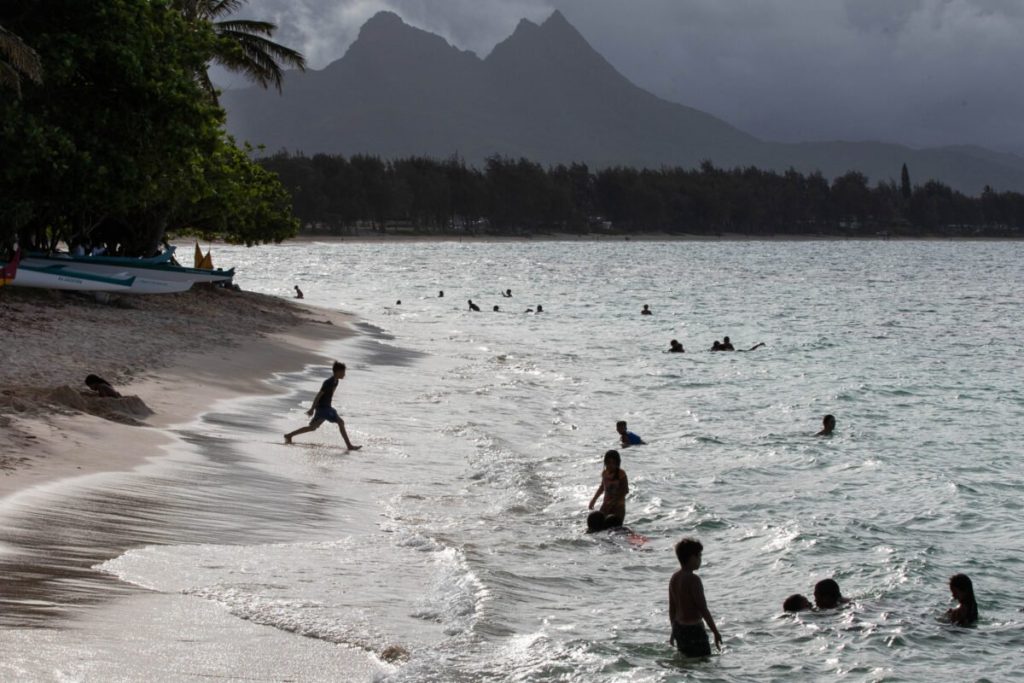Hawaii Officials Promise Changes to Seawall Policies That Have Quickened Beach Destruction

![]()
As the news organizations reported this year, property owners across the islands have used a variety of loopholes to circumvent Hawaii’s environmental laws, winning permits for shoreline structures to protect multimillion-dollar homes at the expense of the state’s beaches, which are disappearing at an alarming rate.
Over the past two decades, state and local officials have granted more than 230 environmental exemptions to owners of homes, hotels and condos statewide. More than a quarter of those involved permitting emergency sandbags to protect properties from lashing waves and rising sea levels.
The permits are typically limited to three years, but the Star-Advertiser and ProPublica found that homeowners rarely remove them when they expire, and state officials repeatedly grant extensions or don’t enforce deadlines.
In response to the reporting, the state Department of Land and Natural Resources is revising its rules governing shoreline structures with a focus on the emergency permits for sandbags. “We’re trying to, like, brace up a boulder with a stick until we find a better way forward,” said Sam Lemmo, administrator for the department’s Office of Conservation and Coastal Lands.
He said it was too early to offer specific policy changes, but he has assigned staff to research ways to “improve our tracking of (emergency authorizations) and our ability to make rational decisions regarding whether or not to allow them to continue.” The Star-Advertiser and ProPublica found that the department terminated just one of the 66 emergency sandbag permits it issued over the past two decades. When the news organizations asked about several permits that had expired, the department said they “fell through the cracks” and vowed to contact the owners.
Gov. David Ige suggested coastal property owners needed to adapt to the realities of climate change by moving inland.
“Sea level rise is here,” the governor said in a statement. “We are already seeing dramatic changes to our coastlines from increased high waves and storm surge due to global climate change, and it’s clear that hardening our shorelines has an impact to our iconic beaches.”
Researchers estimate that roughly a quarter of the beaches on Oahu, Maui and Kauai have already been lost or substantially narrowed because of seawalls over the past century. Future projections are more dire, with scientists warning that most of Hawaii’s beaches could disappear if hundreds of homes, condos, hotels and roads that line the coasts aren’t moved inland.
“This is a time when we need the private sector to work on other solutions such as moving structures away from eroding shorelines,” Ige said.
State policymakers have talked about the idea of so-called managed retreat for years, but little has come of it. Legislation that would require developers to incorporate the impacts of rising seas into their planning or ban building in areas threatened with inundation have failed amid opposition from the real estate industry, which has questioned the science of climate change.
But, in response to the investigation by the Star-Advertiser and ProPublica, some lawmakers plan to try again next year with a bill that would make the risks of buying coastal property clear to prospective buyers. Rep. David Tarnas, chair of the House Committee on Water and Land, said the legislation would require sellers of residential property to provide a written statement disclosing the risks of sea level rise.
A similar measure failed last year due in part to concerns from the real estate industry.
Tarnas said he is now working with the Hawai‘i Association of Realtors and environmental groups to draft a new bill that aims to “make sure we provide sufficient information to potential buyers that they can make well-informed decisions.”
Despite rising seas and damaging storms, some coastal properties on Oahu have been commanding record prices in recent years, often after obtaining emergency sandbags. The news organizations found that about one-third of homes on the island’s North Shore that received emergency authorizations beginning in 2018 have been sold or listed for sale. Some of the buyers said they were unaware of the temporary nature of the permits.
Advocates said they hoped the proposed legislation will help curb further sandbag approvals.
“I think the crux of it is that (the state has) something that says, ‘You’ve acknowledged the risk, and we cannot give you an emergency permit for shoreline stabilization,’” said Lauren Blickley, Hawaii regional manager for Surfrider Foundation, which is working with the Sierra Club and other environmental groups in support of the bill.
Those who still buy should not be able to make claims against the state for sandbags or cleanups, she added.
“It’s not the end all,” Blickley said of the prospective bill, “but definitely a first step we need to have.”
(ProPublica is a nonprofit newsroom that investigates abuses of power. Sign up to receive our biggest stories as soon as they’re published.)
Hawaii Officials Promise Changes to Seawall Policies That Have Quickened Beach Destruction








Responses